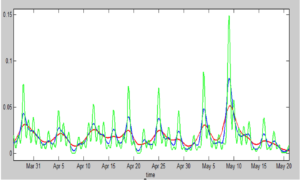As a data scientist, scholar, and professor with a Ph.D. in English and Comparative Literature, I blend technical expertise with literary insight, offering a unique perspective that bridges the gap between data-driven analysis and nuanced textual interpretation. My work focuses on applying machine learning and large language models to evaluate technical documentation in the tech industry, bringing the depth of literary analysis to the world of business and technology.

My interdisciplinary approach provides several key benefits to enterprise level companies:
- Enhanced Communication: Literary analysis techniques help identify narrative structures and rhetorical strategies that can make technical documents more engaging and easier to understand, improving knowledge transfer within organizations.
- User-Centric Design: By applying principles of reader-response theory from literature studies, I help businesses create documentation that better anticipates and meets user needs, leading to improved user experience and customer satisfaction.
- Sociological Sensitivity: Literary studies’ emphasis on context and cultural nuance allows me to help businesses craft documentation that is more inclusive and globally relevant, a crucial factor in today’s interconnected market.
- Pattern Recognition: The skills honed in analyzing complex literary texts translate well to identifying subtle patterns in large datasets, offering insights that purely quantitative approaches might miss.
- Innovative Problem-Solving: The creative thinking fostered by literary studies, combined with technical know-how, leads to novel solutions for improving documentation processes and knowledge management systems.
By leveraging this unique combination of skills, I help businesses not only improve their technical documentation but also gain deeper insights into their communication strategies, ultimately leading to more effective and impactful business practices.
My career explores the dynamic intersection of data science and literature, a unique convergence that brings powerful analytical tools to bear on the rich landscape of textual communication. I use advanced machine learning techniques to analyze complex technical documents, enhancing their clarity and effectiveness while uncovering deeper insights into communication patterns and knowledge structures.
Specifically, my work involves:
- Natural Language Processing (NLP): Employing cutting-edge NLP models to parse and understand technical documents at scale, identifying key themes, jargon usage, and readability levels.
- Sentiment Analysis: Applying sentiment analysis techniques to gauge the tone and emotional impact of technical writing, ensuring that documentation maintains a consistent and appropriate voice.
- Topic Modeling: Utilizing unsupervised learning algorithms to discover latent topics within large collections of technical documents, helping organizations better understand and categorize their knowledge base.
- Text Summarization: Developing AI-powered summarization tools that can distill lengthy technical documents into concise, accessible overviews without losing critical information.
- Coherence Analysis: Implementing algorithms to evaluate the logical flow and coherence of technical narratives, identifying areas where clarity can be improved.
- Cross-referencing and Intertextuality: Creating systems that can identify and leverage connections between different documents, enhancing the overall cohesion of a company’s documentation ecosystem.
- Style Consistency: Developing machine learning models that can ensure stylistic consistency across vast document repositories, maintaining brand voice and technical accuracy.
- Audience Adaptation: Crafting algorithms that can tailor technical content to different audience levels, from novice users to expert practitioners.
By combining these data science techniques with insights from literary theory and textual analysis, I’m able to offer a comprehensive approach to document evaluation and improvement. This methodology not only enhances the clarity and effectiveness of individual documents but also provides strategic insights into an organization’s overall communication patterns and knowledge management practices.
This interdisciplinary approach allows companies to leverage their technical documentation as a strategic asset, improving internal communication, enhancing customer experience, and ultimately driving innovation through clearer, more effective knowledge transfer.
Academic Pursuits
My academic research is situated at the intersection of digital humanities, computational linguistics, and literary studies, focusing on the diachronic analysis of canonical literary works. By employing sophisticated natural language processing (NLP) and machine learning (ML) methodologies, I investigate the complex trajectories of classic texts as they traverse temporal and cultural boundaries. This computational approach to literary analysis allows for the identification of subtle linguistic patterns, thematic evolutions, and intertextual relationships that might elude traditional close reading methods.
Specifically, my work encompasses:
- Corpus Linguistics and Textual Variation: Utilizing large-scale corpus analysis to examine linguistic drift and stylistic evolution in literary texts across different time periods and translations. This approach enables the quantification of semantic shift and syntactic change, offering insights into the malleability of literary language over time.
- Network Analysis of Intertextuality: Applying graph theory and network analysis to map the complex web of allusions, references, and influences among literary works. This methodology reveals the underlying structures of literary influence and cultural transmission.
- Topic Modeling and Thematic Evolution: Implementing latent Dirichlet allocation (LDA) and other topic modeling techniques to trace the emergence, persistence, and transformation of thematic clusters within and across literary epochs.
- Sentiment Analysis and Affective Computing: Employing advanced sentiment analysis algorithms to chart the emotional landscapes of texts, exploring how affective content in literature correlates with broader cultural and historical trends.
- Stylometric Analysis for Authorship Attribution: Developing machine learning models for stylometric analysis to address questions of contested authorship and to explore the evolution of individual authors’ styles over their careers.
- Cross-lingual Analysis of Literary Translation: Utilizing parallel corpus techniques and cross-lingual embeddings to examine how literary works are transformed through translation, shedding light on cultural adaptation and linguistic negotiation.
- Computational Narratology: Applying sequence modeling and event detection algorithms to analyze narrative structures, plot dynamics, and character networks across a corpus of texts.
This multifaceted approach not only uncovers patterns and insights that shed new light on historical and cultural trends in literature but also contributes to the ongoing methodological discourse in digital humanities. By bridging quantitative analysis with qualitative interpretation, my research aims to enhance our understanding of literary evolution, cultural transmission, and the complex interplay between text and context.
Furthermore, this work engages with critical questions in the field, such as the tension between distant and close reading methodologies, the role of computational approaches in literary hermeneutics, and the ethical considerations surrounding the application of AI to cultural heritage. Through this research, I seek to contribute to the development of a more nuanced, data-informed approach to literary historiography and cultural analysis.
Publications & Contributions
I have published numerous papers and articles that highlight my interdisciplinary approach. Some of my notable works include:
- Fidelity, Remix, and the Adaptive Potential: Leveraging Ai and Ml Techniques In Literary Adaptation Theory. 2024. https://doi.org/10.17615/pkpv-p313
- Sussman, C., Landels, T., Bradley, I., Desir, K., Glass, G., Lewis-Meeks, A., & Harwell, J. (2023). “Died a small boy”: Re-Centering the Human in Geospatial Data from the Middle Passage. Archipelagos, 7.
- Glass, Grant. “Disruptive Reading: Resistance to Digitalization in Laurence Stern’s Tristram Shandy and Jonathan Safran Foer’s Tree of Codes.”University of California at Berkeley Comparative Literature Undergraduate Journal.
For a full list of my publications, please visit my CV page.
Get in Touch
I’m always eager to connect with fellow enthusiasts and professionals. Feel free to reach out to me at grantglass@post.harvard.edu.
